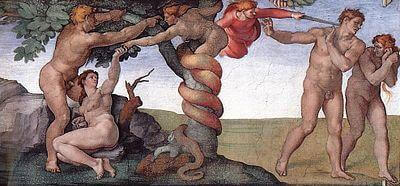Blog Search Results

126 results for had
found
within the Blog
6 displayed out of 126 (0.05seconds)Page 11 of 21

Lent Day 33: Cyril of Jerusalem: Catechetical Lectures: Lecture XXII
Posted by Luke J. Wilson on 7th April 2017 in Lent | Lent,great lent,fasting,early church fathers,devotional,daily reading,Doctor of the Church,lectures,liturgy,catechism,Bishop of Jerusalem,Eucharist,Communion,Real Presence,Transubstantiation
...fter they had been baptised.
When: Around 348-350 AD
You can find today’s reading on page 159 here: lentfatherscomplete.pdf
Today's lecture on the mysteries by Cyril, is on the Body and Blood of Christ and is an exposition based on 1 Cor 11:23-25 —
For I received from the Lord what I also handed on to you, that the Lord Jesus on the night when he was betrayed took a loaf of bread, and when he had given thanks, he broke it and said, “This is my body that is for you. Do this in remembrance of me.” In the same way he took the cup also, after supper, saying, “This cup is the new covenant in my blood. Do this, as often as you drink it, in remembr...
Lent Day 34: Cyril of Jerusalem: Catechetical Lectures: Lecture XXIII
Posted by Luke J. Wilson on 8th April 2017 in Lent | Lent,great lent,fasting,early church fathers,devotional,daily reading,Doctor of the Church,lectures,liturgy,catechism,Bishop of Jerusalem,Eucharist,Lord's Prayer
...fter they had been baptised.
When: Around 348-350 AD
You can find today’s reading on page 162 here: lentfatherscomplete.pdf
Today's final lecture on the mysteries by Cyril, is on the Sacred Liturgy and Communion and is an exposition based on 1 Peter 2:1
1 Peter 2:1Rid yourselves, therefore, of all malice, and all guile, insincerity, envy, and all slander.
Any of my liturgical friends may enjoy this one today. Cyril gives us a breakdown of the liturgy spoken in the church service when they are about to receive communion. I couldn’t help but get a little excited when I read this lecture as it reminded me so much of my Anglican upbringing: the litu...
Was there death before the Fall?
Posted by Luke J. Wilson on 15th April 2014 in Death | Sheol,the Fall,Creation,Genesis,Adam and Eve,death,resurrection
...once God had breathed life into the newly created body; as far as the Hebrew language used in Genesis allows, it only shows that God created people as mortal beings, and that a "soul" is nothing more than a living, breathing creature (I say "creature" instead of "human being", as the same nephesh word is used of animals too in the Creation account - but that's another topic!).
To the Hebrews, the body and soul were one 'unit' that worked together, rather than two separate entities; there was "no idea of an immortal soul living a full and vital life beyond death" and many Psalms and older Biblical texts reflect this idea too (cf. Psalm 6:5; Psalm 88:3-12; P...
Lent: Day 3 - Mathetes to Diognetus, pt. 2
Posted by Luke J. Wilson on 3rd March 2017 in Lent | Lent,great lent,fasting,early church fathers,devotional,daily reading,epistle of mathetes to diognetus
...ecause he had been, in fact, “a disciple of the Apostles” and now had become “a teacher of the Gentiles”! The use of the title “Word” throughout, and the high majestic descriptions of Jesus and the Father does have a striking resemblance to John's gospel, and so there's a possibility that this author may have been a disciple of John.
There's one other thing which I'd like to pull out of today’s reading (although there are many others), and that's the continued description of Christians and their relation to the world in chapter seven. It opens by contrasting the nature and relation of the soul to the body as how Christians are to the world, in tha...
Evidence of the Trinity in the Hebrew Scriptures
Posted by Arnold Fruchtenbaum on 8th November 2017 in Trinity | trinity,monotheism,shema,Jewish,Jews,Messiah,messianic,Jews for Jesus,jewsforjesus.org,tri-unity,creeds
...bsite. He had taken the time to really look into the Tri-unity of God from a Jewish/Hebrew perspective to bring some clarity to the issue.
I found the article to be very helpful for my own understanding, and very illuminating to see the plurality of God in oneness hidden within the Hebrew language, something that is often lost in translation to our English bibles.
I'm no Hebrew scholar, so rather than try (and probably fail) to explain the language nuances to you, I sought permission to post a copy of the original article here. I hope that the information provided is as helpful to you as it was for me.
The original article begins below. Let me know your thoug...
Spiritual Disciplines of the Early Church: Ancient Practices for the 21st Century
Posted by Luke J. Wilson on 17th June 2019 in Early Church |
...I was asked not so long ago what kinds of things Christians did in the Early Church (first to fourth century) as a form of spiritual discipline, on a personal level as well as a corporate one. Though the concept of an individual “personal spiritual life” would have been quite foreign to first century believers as faith and Church was very much a corporate venture that had personal implications, rather than the other way around as it can often appear to be thought of today.
Much of what made Christianity structured, disciplined and set apart from society, has largely been lost in practice, or forgotten and relegated to the annals of history by many practicin...

